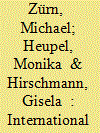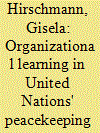|
|
|
Sort Order |
|
|
|
Items / Page
|
|
|
|
|
|
|
| Srl | Item |
| 1 |
ID:
164434


|
|
|
|
|
| Summary/Abstract |
Human rights violations committed by international organisations (IOs) have raised demands that IOs should be held accountable for their decisions, policies, and actions. However, traditional forms of accountability have often failed in the context of global governance. This article introduces pluralist accountability as a form of accountability whereby third parties hold IOs and their implementing partners accountable for human rights violations. In pluralist accountability, third parties set the standards for IOs’ actions in relation to human rights, review their behaviour and impose normative or material sanctions in case of misbehaviour. The article further reveals two conditions that foster the development of pluralist accountability, namely the competition among third parties and the degree of vulnerability of the implementing actors or the mandating authority with regard to human rights demands. This argument is illustrated with empirical insights from peace operations in Bosnia and Kosovo, which were accused of human trafficking and the violation of the rights of detainees.
|
|
|
|
|
|
|
|
|
|
|
|
|
|
|
|
| 2 |
ID:
158727


|
|
|
|
|
| Summary/Abstract |
Human rights violations by international organisations (IOs) are a possible side effect of their growing authority. Recent examples are the cases of sexual exploitation by UN peacekeepers and violations caused by IMF austerity measures. In response, IOs increasingly develop safeguards to protect human rights from being violated through their policies to regain legitimacy. We argue that this development can be accounted for by a mechanism we call ‘authority-legitimation mechanism’. We test this theoretical expectation against ten case studies on UN and EU sanctions policies, UN and NATO peacekeeping and World Bank and IMF lending. Next, we demonstrate inductively that the authority-legitimation mechanism can evolve through different pathways, depending on which actors get engaged. We label these pathways legislative institution-building if parliaments in member states put pressure on their governments to campaign for human rights safeguards in IOs, judicial institution-building if courts demand human rights safeguards, like-minded institution-building if civil society organisations, middle powers and IO bodies with little formal power push for human rights safeguards, or anticipatory institution-building if IOs adopt such safeguards from other IOs without having violated human rights themselves. Finally, we argue that which of these pathways are activated and how effective they are depends on specific conditions.
|
|
|
|
|
|
|
|
|
|
|
|
|
|
|
|
| 3 |
ID:
185577


|
|
|
|
|
| Summary/Abstract |
International organizations (IOs) play a key role in promoting multilateral cooperation on critical transnational issues. Yet, their authority has increasingly been contested by member states that cut financial contributions or even withdraw their membership. How do IOs respond to such contestation? While the existing literature has mostly focused on reactions by other member states, I argue in this article that our understanding of IOs' responses to contestation remains incomplete without an analysis of IO bureaucracies. I propose a conceptual framework to analyse three types of bureaucratic responses: inertia, i.e. no immediate response; adaptation, i.e. institutional changes to maintain the support of the challenging member state(s); and resilience-building, i.e. developing organizational capacities to limit contestation. I argue that each of these responses is shaped by specific bureaucratic mechanisms, namely hunkering, negotiation, framing, coalition-building, shaming and professionalization. Based on a comparative within-case study analysing the reactions of the United Nations Population Fund (UNFPA) to budget cuts by the Reagan, Bush and Trump administrations, I further theorize that the organization's threat perception, the position of other member states and bureaucratic leadership are relevant factors that need to be considered to explain the variation in IO responses to contestation.
|
|
|
|
|
|
|
|
|
|
|
|
|
|
|
|
| 4 |
ID:
115273


|
|
|
|
|
| Publication |
2012.
|
| Summary/Abstract |
This article illustrates how organizational learning can explain the shift in United Nations' peacekeeping exit strategies from the election-based approach of the 1990s to peacebuilding. Conceptualizing learning as an ideal-type, three-step process, of knowledge acquisition, interpretation and institutionalization, the analysis reveals the impact of new knowledge on institutional change. It demonstrates how knowledge acquisition became systematized within the United Nations' Secretariat especially after 2000, with the active promotion of boundary-spanning activities. The analysis then shows how a shared understanding of the role of peacebuilding for exit strategies was developed by the organization's bureaucracy and intergovernmental bodies in the interpretation step. Finally, it highlights how the establishment of the Peacebuilding Commission institutionalized the transition to peacebuilding as the new exit strategy and how new learning capacities were created. By conceiving the interaction between international organizations and their external environment as a dynamic relationship, the analysis confirms the potential of organizational learning theories for explaining institutional change in international relations.
|
|
|
|
|
|
|
|
|
|
|
|
|
|
|
|
| 5 |
ID:
113104


|
|
|
|
|
| Publication |
2012.
|
| Summary/Abstract |
This article explores the relationship between the concept of 'organized hypocrisy' and institutional reform in UN peacekeeping. It first demonstrates how the organized hypocrisy in exit strategies arose from the discrepancy between rhetoric, peacekeeping mandates and actions in the field. The analysis then shows how, as a response to organized hypocrisy, peacebuilding replaced the election-based approach of exit strategies from the early 1990s. By evaluating the institutionalization of peacebuilding, the study reveals the hypocritical potential of reform; complex mission mandates, as well as the Peacebuilding Commission, exhibit elements of counter-coupled organized hypocrisy and meta-hypocrisy that remain unresolved.
|
|
|
|
|
|
|
|
|
|
|
|
|
|
|
|
|
|
|
|
|